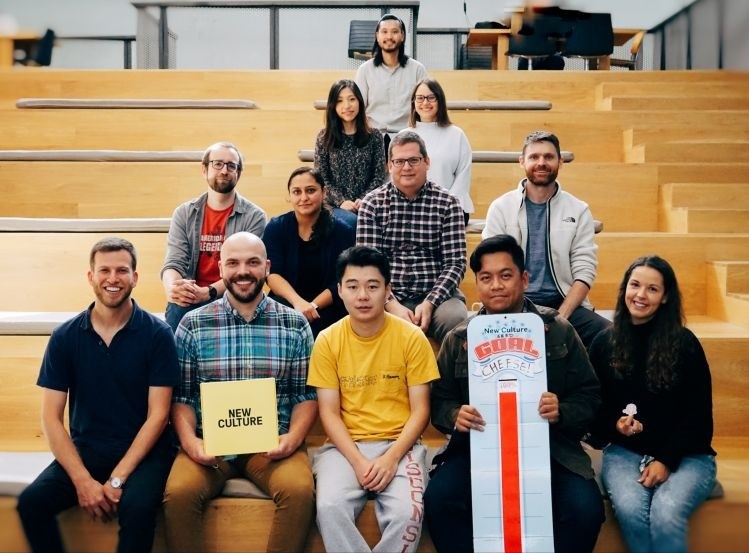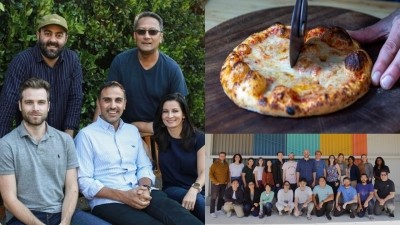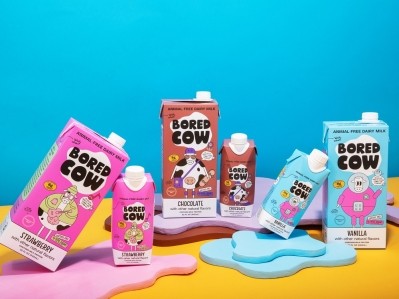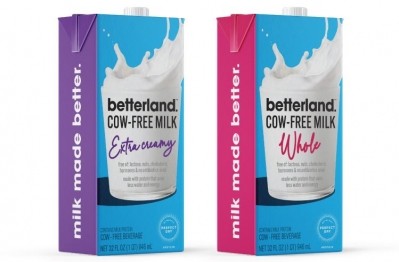New Culture raises $25m as 'animal-free dairy' space heats up

The funding was announced a week after General Mills dipped its toes in the animal-free dairy waters with the launch of cream cheese alternative Bold Cultr, which contains animal-free whey proteins from Perfect Day, and follows recent funding announcements from a flurry of startups in this space including Imagindairy, Change Foods, Perfect Day, Formo, Remilk, Those Vegan Cowboys, Nobell Foods and Moolec Science.
While plant-based dairy products continue to improve, plant-based cheese presents particular formulation challenges, in part because it’s hard to replicate the functional qualities of casein, the protein in cow’s milk responsible for the ‘stretchy’ quality of cheese such as mozzarella, claims New Culture.
While consumer products featuring animal-free whey protein (ice cream, cream cheese, protein powders, baking mixes) are already on the market, casein is more difficult to produce at scale via microbial fermentation, claimed co-founder Matt Gibson, a new Zealander who moved to California to build New Culture (strapline: 'Cow cheese, without the cow').
Casein proteins
Gibson's co-founder synthetic biologist Inja Radman - who has not revealed what types of microbes New Culture is using (fungi, yeast, bacteria) - told FoodNavigator-USA: “Casein proteins are very difficult to make using precision fermentation, but we have made numerous breakthroughs to produce substantial amounts of animal-free casein protein. This ability to make significant quantities of casein protein has enabled us to be the only company 100% focused on mozzarella, as mozzarella is so reliant on casein.”
"We looked at a wide range of cheeses - soft, hard, you name it. Ultimately, we chose mozzarella because it is the most consumed cheese in the US, and yet simultaneously the cheese with the biggest gap in quality between dairy and plant-based vegan options. We knew we could make a big impact on sustainability, animal welfare, and climate change by producing a great animal-free mozzarella that actually competes with the dairy version coming from animal milk.
"We are hard at work to bring a wide array of products to restaurants and grocery stores, starting with pizzerias. Our cheese will be available in select dining experiences later in 2022 with broader distribution starting in 2023."
As for the branding strategy, Gibson said: "We are excited about being able to produce and sell New Culture cheese as a branded product and, with our food service partners, through co-branded pizza products. We’ll be starting with these branded products and then shift into ingredient opportunities at a later date."
Pizza tastings
New Culture has hosted a series of pizza tastings in recent months to showcase the versatility of its cheese in in 850°F professional pizza ovens and 500°F home ovens, said Gibson.
Asked about the manufacturing set up, he said: "In order to scale up our cheese product there are multiple steps along the way that require a range of partners. We’re thrilled to have several of those relationships already in place with more to come. Wherever we can partner with established industry players, we will, whether that’s in making casein or with co-manufacturers for cheese production."
Right now, Gibson has an 11-strong team in San Leandro, CA, but will be hiring several new team members armed with cash from the latest funding round.
As for the regulatory pathway forward, Gibson told us: "The GRAS [Generally Recognized as Safe] process is critical for us and we’re hard at work gathering the necessary data to carry out the process. We’re already in conversations with the FDA and looking forward to achieving major GRAS milestones during our Series A phase."

Gibson – who has a degree in genetics and microbiology - is using synthetic biology techniques to insert DNA sequences into microbes that effectively ‘program’ or ‘instruct’ them to express his target proteins (alpha caseins, kappa caseins and beta caseins) after feeding on a sugary substrate.
These can be formed into casein micelles, or clusters of casein proteins, which when produced by cows, fold up into a spherical ‘micelle’ structure so that the casein proteins can remain suspended indefinitely in the milk water, said Gibson in a recent interview with this publication.
“We are making a range of casein proteins and have completely mastered the art of reconstituting casein micelles with any and all types of animal-free casein.
“Casein micelles give milk its color, functionality, nutrients, and ability for milk to go through the cheesemaking process and form any cheese of choice including mozzarella, unlike whey, which makes only limited cheeses such as ricotta and cream cheese. We can make delicious cheese with and without caseins in a micellar form.”
‘We add the same salts that are naturally found in cow’s milk and let nature do its thing’
So what else will be in New Culture's mozzarella aside from animal-free casein? “We have a very clean label, aside from animal-free casein we have plant-based fats, a small amount of plant-based sugar, some salts, vitamins, and minerals,” said Gibson.
As for calcium and other minerals and vitamins found in dairy cheese, he said, “We use calcium and other salts as a sort of catalyst to induce micelle formation by allowing the casein proteins to begin packing these salts and forming casein micelles.
“We add the same salts that are naturally found in cow’s milk and let nature do its thing.”
The GMO factor
Asked whether the use of genetic engineering may deter some consumers, Gibson observed that genetically engineered microbes are already widely used in cheese making to produce rennet, although most consumers are unaware of this.
While rennet used to be made from the stomachs of newborn cows, he said, today it’s made with an enzyme (chymosin) that’s been produced via fermentation using a genetically engineered bacterium.
And while the proteins Gibson is making are produced by a genetically engineered microbe, that microbe is not present in the casein proteins themselves, which are the same as those produced by cows, and would not trigger a ‘bioengineered’ food label under new US GMO labeling laws.
General Mills' Bold Cultr launch helps validate animal-free proposition
Asked about General Mills' recent move into the animal-free dairy market with Bold Cultr, he said: "As a first mover in the animal-free dairy industry, we’re energized whenever we see this sort of activity from larger players.
"Not only does it validate our business proposition but it also helps spread the New Culture vision to new geographies and consumer segments. In order to transform the future of dairy, we’re going to need a fundamental shift in the industry and we’re excited to have the backing of some of the most renowned companies in the food and fermentation worlds that are pushing the industry ahead alongside New Culture."
* Other backers include Alumni Ventures, Be8 Ventures (Dr Oetker’s venture arm), ADM Ventures, S2G Ventures, Future Ventures, Marinya Capital, Evolv Ventures (the corporate venture arm of Kraft Heinz), SOSV’s IndieBio, Bee Partners, Mayfield, and Bluestein Ventures.



















